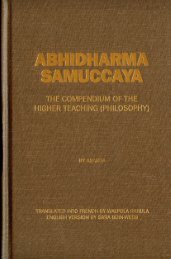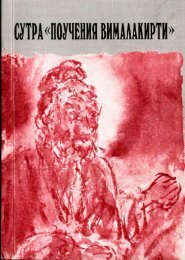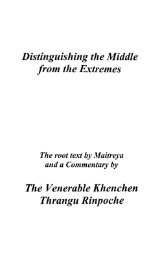- Page 2: Abhidharmakosabhasyam Volume IV
- Page 5 and 6: ASIAN HUMANITIES PRESS Asian Humani
- Page 7 and 8: (called in other traditions the Fou
- Page 10 and 11: C O N T E N T S Chapter Seven: The
- Page 12 and 13: Footnotes 3. The Four Unhindered Kn
- Page 14 and 15: d The Deliverances and the Third Dh
- Page 16 and 17: C H A P T E R S E V E N The Knowled
- Page 18 and 19: The Knowledges 1089 impure or world
- Page 20 and 21: The Knowledges 1091 spheres, becaus
- Page 22 and 23: The Knowledges 1093 6b-d. The Srava
- Page 24 and 25: The Knowledges 1095 But we have sai
- Page 26 and 27: __ The Knowledges 1097 2. By reason
- Page 28 and 29: The Knowledges 1Q99 The knowledge o
- Page 30 and 31: says, "He knows in truth the concen
- Page 32 and 33: i. How does it not conform to the S
- Page 36 and 37: "associated with hatred." When the
- Page 38 and 39: _ The Knowledges 1109 The Foreign M
- Page 40 and 41: The Knowledges НИ shoot, stalk...
- Page 42 and 43: 2. Suffering, because it is repugna
- Page 44 and 45: The Knowledges 1115 "All the samskd
- Page 46 and 47: Prajnd and all the other dharmas wh
- Page 48 and 49: What are the other knowledges? They
- Page 50 and 51: The Knowledges 1121 How many dharma
- Page 52 and 53: The Knowledges 1123 As for the Arya
- Page 54 and 55: The Knowledges 1125 at the moment o
- Page 56 and 57: ^ The Knowledges 1127 The Vaibhasik
- Page 58 and 59: The Knowledges 1129 With respect to
- Page 60 and 61: ^ The Knowledges 1131 when he is no
- Page 62 and 63: The Knowledges 1133 In all these pa
- Page 64 and 65: Is everything that has been previou
- Page 66 and 67: We shall examine first the nature o
- Page 68 and 69: The Knowledges 1139 The knowledge o
- Page 70 and 71: The Knowledges 1141 According to th
- Page 72 and 73: not experience joy and displeasure,
- Page 74 and 75: The Knowledges 1145 whereas great c
- Page 76 and 77: ^ The Knowledges 1147 object; 203 2
- Page 78 and 79: The first three are common to both
- Page 80 and 81: 37b. But it has all for its object.
- Page 82 and 83: The Knowledges 1153 39b. It is made
- Page 84 and 85:
• The Knowledges 1155 the word of
- Page 86 and 87:
The Knowledges 1157 possess them. 2
- Page 88 and 89:
43d. Five exist in the Four Dhyanas
- Page 90 and 91:
The Knowledges 1161 44a. They have
- Page 92 and 93:
that a being is endowed with a ment
- Page 94 and 95:
The Knowledges 1165 45d. Because th
- Page 96 and 97:
them one first or forcefully makes
- Page 98 and 99:
The Knowledges 1169 Sravakas and Pr
- Page 100 and 101:
The Knowledges 1171 These minds are
- Page 102 and 103:
51b. But speech also takes place th
- Page 104 and 105:
The Knowledges 1175 fictive beings;
- Page 106 and 107:
The Knowledges 1177 light and sound
- Page 108 and 109:
^__ The Knowledges 1179 This knowle
- Page 110 and 111:
Footnotes 1181 1. This Chapter is d
- Page 112 and 113:
Footnotes 1183 20. On the paracitta
- Page 114 and 115:
Footnotes 1185 only eight pairs: sa
- Page 116 and 117:
Footnotes 1187 74. The thoughts of
- Page 118 and 119:
Footnotes 1189 95. On pravrtti, ii.
- Page 120 and 121:
Footnotes 1191 approved of by Samgh
- Page 122 and 123:
137. See vi.6lb. 138. See vii.5c Fo
- Page 124 and 125:
Footnotes 1195 152. Bhdvand which c
- Page 126 and 127:
Footnotes 1197 khapratisamvedievamd
- Page 128 and 129:
Footnotes 1199 kaicic chramano vd b
- Page 130 and 131:
Footnotes 1201 197. The word ddi is
- Page 132 and 133:
Footnotes 1203 the future; the same
- Page 134 and 135:
Footnotes 1205 has attained Bhavagr
- Page 136 and 137:
Footnotes 1207 248. Vydkhyd: In the
- Page 138 and 139:
Footnotes 1209 Paramartha and Hsuan
- Page 140 and 141:
Footnotes 1211 iuddhaka dhydna or a
- Page 142:
Footnotes 1213 325. The treatise of
- Page 145 and 146:
1216 Chapter Eight The Dhyanas as e
- Page 147 and 148:
1218 Chapter Eight What are the exc
- Page 149 and 150:
1220 Chapter Eight b. The Dhyanas a
- Page 151 and 152:
1222 Chapter Eight "without physica
- Page 153 and 154:
1224 Chapter Eight 4. There would b
- Page 155 and 156:
1226 Chapter Eight remains in the m
- Page 157 and 158:
1228 Chapter Eight free from the de
- Page 159 and 160:
1230 Chapter Eight The Third Dhyana
- Page 161 and 162:
1232 Chapter Eight happiness becaus
- Page 163 and 164:
1234 Chapter Eight ascetic would fa
- Page 165 and 166:
1236 Chapter Eight useful to the Dh
- Page 167 and 168:
1238 Chapter Eight These two texts
- Page 169 and 170:
1240 Chapter Eight do the absorptio
- Page 171 and 172:
14c. One acquires them, undefiled,
- Page 173 and 174:
1244 Chapter Eight How many types o
- Page 175 and 176:
1246 Chapter Eight know a defiled a
- Page 177 and 178:
1248 Chapter Eight Therefore it is
- Page 179 and 180:
1250 Chapter Eight who are delivere
- Page 181 and 182:
1252 Chapter Eight dharmas that exi
- Page 183 and 184:
1254 Chapter Eight The samantakas a
- Page 185 and 186:
1256 Chapter Eight 23c. It has Maha
- Page 187 and 188:
1258 Chapter Eight Suffering) and t
- Page 189 and 190:
1260 Chapter Eight the absorption o
- Page 191 and 192:
1262 Chapter Eight spheres, namely
- Page 193 and 194:
1264 Chapter Eight 29a. The Immeasu
- Page 195 and 196:
1266 Chapter Eight 30a-c. Their asp
- Page 197 and 198:
1268 Chapter Eight the higher Dhyan
- Page 199 and 200:
1270 Chapter Eight discovering the
- Page 201 and 202:
1272 Chapter Eight 32b. They are in
- Page 203 and 204:
1274 Chapter Eight A mind in Bhavag
- Page 205 and 206:
1276 Chapter Eight transforms objec
- Page 207 and 208:
1278 Chapter Eight The first eight
- Page 209 and 210:
1280 Chapter Eight All-Encompassing
- Page 211 and 212:
1282 Chapter Eight This present tre
- Page 213 and 214:
1284 Chapter Eight 14. According to
- Page 215 and 216:
1286 Chapter Eight the body exists,
- Page 217 and 218:
1288 Chapter Eight possessing-*iT*f
- Page 219 and 220:
1290 Chapter Eight (= Sukhendriya n
- Page 221 and 222:
1292 Chapter Eight 80. Paramartha o
- Page 223 and 224:
1294 Chapter Eight return, up to Bh
- Page 225 and 226:
1296 Chapter Eight sa-vicdra, etc.
- Page 227 and 228:
1298 Chapter Eight nirdistdni...; M
- Page 229 and 230:
1300 Chapter Eight 153. The fourth
- Page 231 and 232:
1302 Chapter Eight (TD 41, p. 798Ы
- Page 233 and 234:
1304 Chapter Eight non-desire (alob
- Page 235 and 236:
1306 Chapter Eight of the Three Dvi
- Page 237 and 238:
1308 Chapter Eight 214. The Saddham
- Page 239 and 240:
1310 Chapter Eight d. Samyukta, TD
- Page 242 and 243:
C H A P T E R N I N E Refutation of
- Page 244 and 245:
Refutation of the pudgala 1315 A bl
- Page 246 and 247:
Refutation of the pudgala 1317 mean
- Page 248 and 249:
Refutation of the pudgala 1319 [The
- Page 250 and 251:
Refutation of the pudgala 1321 matt
- Page 252 and 253:
Refutation of the pudgala 1323 This
- Page 254 and 255:
Refutation of the pudgala 1325 pudg
- Page 256 and 257:
Refutation of the pudgala 1327 [The
- Page 258 and 259:
Why may it not be explained in thes
- Page 260 and 261:
Refutation of the pudgala 1331 laym
- Page 262 and 263:
Refutation of the pudgala 1333 that
- Page 264 and 265:
. Refutation of the pudgala 1335 in
- Page 266 and 267:
Refutation of the pudgala 1337 soul
- Page 268 and 269:
Refutation of the pudgala 1339 If t
- Page 270 and 271:
memory? Refutation of the pudgala 1
- Page 272 and 273:
ody of Devadatta is produced in dif
- Page 274 and 275:
Refutation of the pudgala 1345 part
- Page 276 and 277:
Refutation of the pudgala 1347 the
- Page 278 and 279:
Refutation of the pudgala 1349 not
- Page 280 and 281:
Refutation of the pudgala 1351 [The
- Page 282 and 283:
Refutation of the pudgala 135 3 tha
- Page 284 and 285:
Refutation of the pudgala 1355 red
- Page 286 and 287:
Footnotes 1357 the Buddha declared
- Page 288 and 289:
Footnotes 1359 1. Vyakhyd: kirn kha
- Page 290 and 291:
Footnotes 1361 21. See below note 3
- Page 292 and 293:
Footnotes 1363 vyanjanapratisaranen
- Page 294 and 295:
Hsiao-dgama" (TD 2, number 100). Fo
- Page 296 and 297:
Footnotes 1367 Samyuktahrdaya (see
- Page 298 and 299:
Footnotes 1369 ca prativigacchati {
- Page 300 and 301:
Footnotes 1371 96. For the second s
- Page 302 and 303:
Footnotes 1373 111. Vydkbyd: у a e
- Page 304 and 305:
Footnotes 1375 gloss bhdvandvifesdt
- Page 306 and 307:
Footnotes \Ы1 the dharmalaksanas."
- Page 308 and 309:
Footnotes 1379 165. Vydkhyd: phale
- Page 310 and 311:
I N D E X (This Index contains refe
- Page 312 and 313:
Index 1383 dkdsa; see space AkaSana
- Page 314 and 315:
Index 1385 268,270,276,365-9,373,37
- Page 316 and 317:
avyaksas, 691. awareness, 1142-3, 1
- Page 318 and 319:
Index 1389 c Caitra, 1340-2. Caitra
- Page 320 and 321:
Index 1391 850. Cullavagga, 459. cu
- Page 322 and 323:
Index 1393 1257-8,1273,1318,1320,13
- Page 324 and 325:
ear, 74, 123, 277, 1163, 1175, 1177
- Page 326 and 327:
Index 1397 1119,1127,1136,1142-3,11
- Page 328 and 329:
indifference (upeksd), 83,130,155,
- Page 330 and 331:
Index 1401 KaSmir, Masters of, 236,
- Page 332 and 333:
Index 1403 Mahdndmasutra, 598-600.
- Page 334 and 335:
Index 1405 mithydkarmdnta; see wron
- Page 336 and 337:
Index 1407 697-8, 768, 774, 787, 80
- Page 338 and 339:
Index 1409 50, 957, 976, 983, 989-9
- Page 340 and 341:
Index 1411 1269-70; see also rhinoc
- Page 342 and 343:
Index 1413 566,1024,1030. Right con
- Page 344 and 345:
and Sensations), 230-1,1271,1273. s
- Page 346 and 347:
Index 1417 1150, 1330, 1340; Seeing
- Page 348 and 349:
Index 1419 §ruta\ see hearing. sru
- Page 350 and 351:
Index 1421 1257. transformation (pa
- Page 352 and 353:
Index 1423 8b3 12al3 18c28 22a2 33b
- Page 354 and 355:
Index 1425 432c3 434cl 440bl7 444c2
- Page 356 and 357:
Index 1427 Vihara, 918. Vijnana; se


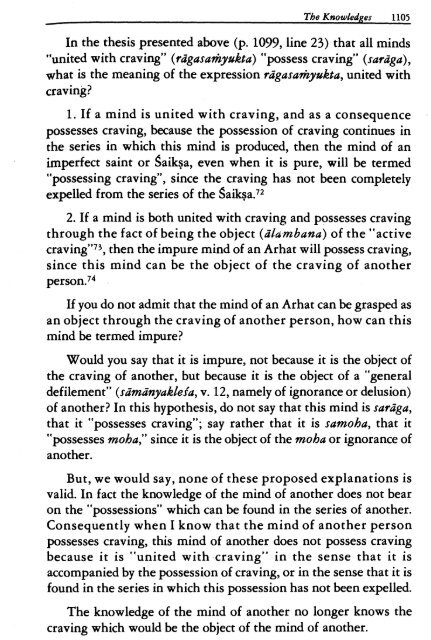

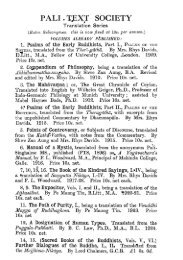







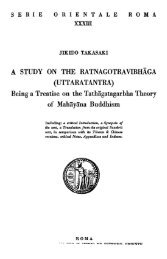
![Long Discourses of the Buddha [Digha Nikaya]](https://img.yumpu.com/32792419/1/164x260/long-discourses-of-the-buddha-digha-nikaya.jpg?quality=85)
